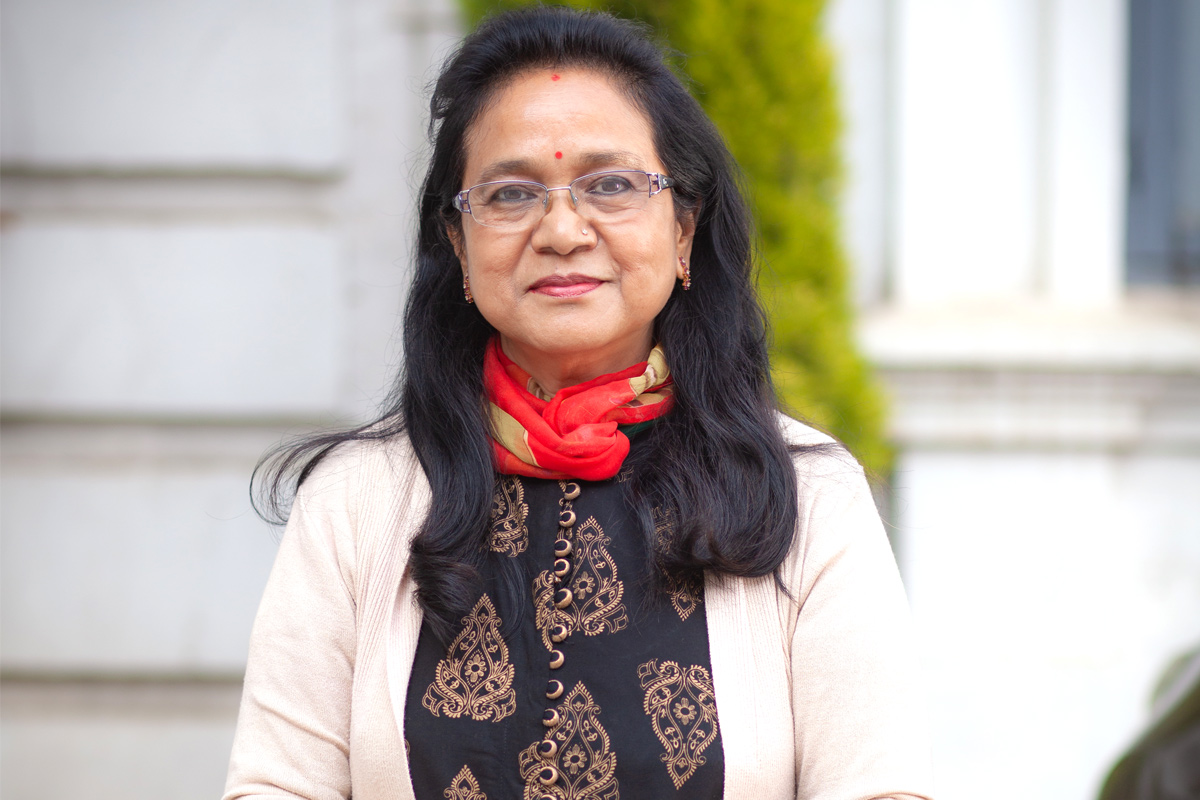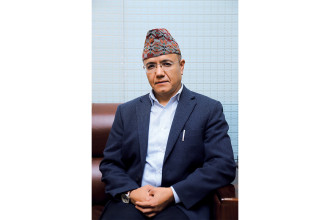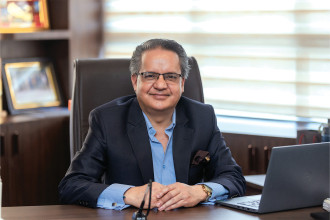
After completing her Bachelor’s degree in Science and Master’s degree in Business Administration, Sheela Kansakar Karkee joined the Nepal Police and served in the Computer Technology section of Nepal Police for 28 years. She entered the police force as an Inspector in the role of an Analyst/Programmer. As one of the leaders in the team that established the Computer Section in Nepal Police in 2046 BS, Karkee’s role as a System Analyst was vital to design and develop the software to computerise all the information in Nepal Police. She considers the establishment of the IT Directorate in Nepal Police as her most successful contribution to the IT sector.
Karkee built her career and contributed most of her life to the development of the IT sector in Nepal Police where information plays a vital role, especially in the field of security and investigation. “We performed all the jobs within a team, the efficient working of which is critical to any organisation,” she states.
In the initial stage of her career, Karkee also had the opportunity to work with the National Computer Center for two years and with the Social Service National Coordination Council as a System Analyst and Computer Program Officer respectively for two years before joining the Nepal Police. “I have 32 years of my career in the field of ICT,” highlights Karkee.
After leaving Nepal Police as DIGP in 2018, she along with Ganga Bhandari, Shankar P Sharma, Ram Krishna Dahal, Dilli Chaudhary, Dr.Pramod Parajuli, Milan Raj Nepali, Dr. Pawan Kumar Sharma and Chiranjibi Adhikari founded CSRI in 2018 as part of the cyber security domain research programme of which she is an Executive Member. The organisation works to provide industry-driven cyber security analysis outcomes that will create an impact and addresses real world cyber secuity issues with innovative solutions. CSRI is also engaged in raising cyber security awareness with a focus on legal, policy and regulative implications of cyber security risks. It also works to develop and mentor the future generation of cyber security professionals.
Karkee shares that her mother had the most impact on her life while she appreciates her father for supporting the family financially. “When I was doing my Masters degree, my father passed away. My mother inspired me to join Nepal Police,” informs Karkee.
Karkee is a life member of JICA Alumni Association of Nepal, is associated with Socio-Economic Development for Energetic Women and Centre for Disaster Management Studies, Executive Member of CAN Federation, and Vice-President of Women in Information Technology.
Excerpts of an interview with Dibesh Dangol of B360 on what leadership means to Sheela Kansakar Karkee:


What is your definition of leadership?
In my view, a leader is someone who leads with social influence to achieve a desired common goal. Leadership involves being effective at whatever one works on with effective communication skills, the ability to delegate, great self-awareness, influence, integrity, and the ability to learn quickly.How do you keep yourself motivated in your work?
I focus and try to be clear on concepts to accomplish any work. Taking responsibility plays a vital part. I have always tried to get more and more feedback on my work from my colleagues so that I can improve, be positive and keep myself motivated in my work.What are the challenges you have faced in your roles as a leader?
We are in the 21stcentury and still living in a male-dominated society with prevalent gender discrimination. There were many times when I have felt irritated and mentally harassed due to gender discrimination, but I always tackled such issues with a brave face. It is a fact that there are only a few women at the top level in leadership positions and because of this many men immaturely assume that women cannot be great leaders, that women are born only to follow and not to lead. However, that’s their opinion and there’s no point in being affected by it. The only thing you can do is show them great leadership skills. I am very proud of being a female and leader. I have faced a lot of challenges during my career to advance and reach the top finally becoming the Director of IT Directorate in Nepal Police as a DIGP. After overcoming those challenges, now I feel they were not challenges but rather opportunities for me to grow. I’ve always fought for my juniors for their rights in the workplace, and because of this, often my seniors have been unhappy with me. However, I am satisfied with my choices and decisions at work and whatever I have been able to accomplish regardless of who dislikes me.Is it correct to say that an individual’s gender can obstruct them from fulfilling their duties, especially in leadership roles?
The only difference I see between males and females is that generally, females take care of their children more and have added responsibilities apart from work. We should know that obstructions will always be there but we need to manage and tackle those carefully, especially when in leadership positions.What are the greatest strengths and weaknesses of a leader?
The greatest strengths of a leader are excellent communication skills, negotiation skills, situational awareness, self-awareness, positivity, ability to support as well as inspire others, honesty and integrity, decision-making capabilities, accountability, responsibility, confidence, delegation and empowerment. The greatest weaknesses of a leader could be negativity or failing to set clear expectations, misunderstanding and lacking trust with teammates and employees, hypocrisy and stagnancy.How important is the team for a leader?
Every team member plays a crucial role for any leader as without them there is no way for them to be a leader as there will be no one to lead. There is always a need for leadership to involve everyone on the team to go in the same direction and work towards the same goal. However, leadership and teamwork have a direct effect to fulfill organisational objectives. A leader should have the power to motivate and inspire team members to use their talents. A leader should be responsible for motivating, delegating, inspiring, communicating with team members.Whose leadership skills come to your mind when think of a ‘great leader’?
There is no such businessperson or celebrity that I’ve considered as a great leader as I have never indulged myself with any biographies or followed anyone. My mother has always been an inspiration for me and I’ve always seen great leadership qualities in her.What would you consider your most significant accomplishment as the Founder and Executive Member of CSRI?
In this digital age, cyber-crime has become a global problem. It has mostly affected females. There is an interconnected world created by the virtue of social media platforms, and the majority of the population is susceptible to cyber-attacks. The main cause is a lack of knowledge and awareness of cyber security. Everyone should be aware of protecting their privacy through the internet via social media. As the founder and executive member of CSRI, I consider my most significant accomplishment to be the transforming experiences of recipients from the skills and knowledge they received locally as well as at community levels.How are women leaders different from men leaders?
Leadership means the same whether the leader is a man or a woman. There certainly are many styles of leadership one encompasses. However, speaking from my experiences, I’ve seen more participative and encouraging styles of leadership by women, making them more transformational as a result. I’ve found many men leaders to be very stereotypical to be effective; however, it is on a case basis.
Published Date: March 30, 2021, 12:00 am
Post Comment
E-Magazine
RELATED Leadership




-(1)-1752214965.jpg)